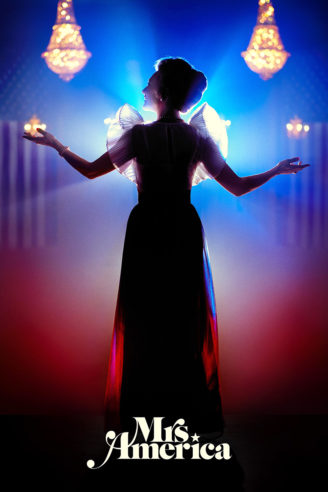Mrs America is neither the takedown of a conservative activist feared by the right nor the glorification feared by the left.
The Hulu drama series fairly portrays both sides of the debate over the Equal Rights Amendment (ERA): the feminist movement, led by the likes of Bella Abzug (Margo Martindale) and Gloria Steinem (Rose Byrne), and the anti-feminist reaction, led by Phyllis Schlafly (Cate Blanchett).
The series sticks close to the truth (Cornelia Channing has tracked the historical accuracy of all eight episodes for Slate), which is why this review will reveal a little more about the plot than we usually do. If you don’t want any spoilers, watch the series first (I recommend you do anyway!) and then come back.
Aside from the costumes, music and production design, which are all top-notch and gloriously 1970s — and aside the perfect casting — what makes the series resonate is that its lessons are so timely. The fight over the ERA, which proposed to enshrine gender equality in the Constitution of the United States, revealed flaws on the left and right that are still with us.
The feminist movement was at its apex in the early 70s but believed history was on its side and couldn’t imagine the tide turning against it. There are heartfelt moments in the series where Abzug, Steinem and their cohorts throw caution to the wind to campaign not just for gender equality but abortion and gay rights. It is brave and sincere, but also why they failed.
The women’s movement couldn’t prioritize and refused to compromise. That allowed reactionaries like Schlafly to portray them as radical liberals (there is only one Republican among the feminists, Jill Ruckelshaus) — and defeat them.
The parallels with the modern social-justice movement are obvious. Cultural and social change seldom comes in one fell swoop. Better to take it one step at a time. The movement for gay rights is a good example. First gay sex was decriminalized. Then came civil unions. Then marriage equality. Now the fight is for protection in the workplace and equal adoption rights. If the gay-rights movement had argued same-sex couples should be allowed to adopt children back in the 1970s, it would probably not have come as far, and as fast, as it did.
If progressives need to learn pragmatism, conservatives need to remember principle. Schlafly didn’t care about the ERA (she was interested in national security) until she realized she could use it to advance her own career in right-wing politics. But at what cost? She allied with the far right, enabling their normalization, and threw in her lot with Ronald Reagan only to receive nothing in return. Before her death in 2016, Schlafly even endorsed Donald Trump.
Schlafly was hardly the only one, and what good has it done the Republican Party? A thrice-married philanderer, Trump has made a mockery of the party’s “family values”. He has no understanding of constitutional law, nor does he appear to appreciate the virtues of limited government. He has reversed Republican policy on everything from trade to relations with Russia. He has alienated college-educated, ethnic-minority, female and suburban voters, which will make it harder and harder for the Republican Party to win national elections in the future.
Like Schlafly’s followers in the 1970s, too many on the American right today will blindly support whatever is the opposite of what liberals want. They aren’t driven by what they’re for, but by what they’re against. It’s the politics of ressentiment, which Schlafly exploited in her time and Trump exploits now.





